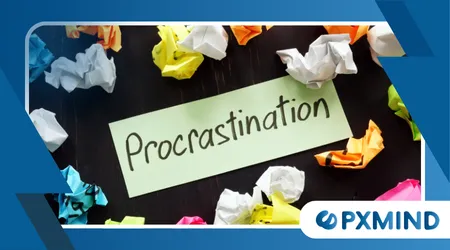La psicologia della procrastinazione e come sconfiggerla

Comprendere le radici profonde dell' Psicologia della procrastinazione e come sconfiggerla è il primo passo per riprenderti il tuo tempo e il tuo potenziale.
Annunci
L'eterna lotta con l'avvio di un compito, un fenomeno pressoché universale nell'esperienza umana, è più complessa della semplice pigrizia.
Questo comportamento pervasivo, spesso scambiato per una cattiva gestione del tempo, è in realtà un sofisticato problema di regolazione emotiva, non un difetto caratteriale.
Non rimandiamo perché non abbiamo voglia di lavorare, ma perché evitiamo i sentimenti negativi associati al compito stesso.
Cosa spinge a evitare i compiti? Il nucleo emotivo del ritardo. Psicologia della procrastinazione e come sconfiggerla.
La procrastinazione è fondamentalmente una strategia per ripristinare l'umore a breve termine. Quando ci si trova di fronte a un compito, soprattutto se difficile o spiacevole, il nostro cervello registra un disagio.
Per sfuggire a questa immediata sensazione negativa, ci dedichiamo a un'attività più piacevole o meno impegnativa.
Questo sollievo temporaneo rafforza il circolo vizioso, creando un'abitudine all'evitamento. Perché sopportare l'angoscia ora, quando la gratificazione immediata è facilmente disponibile?
Come razionalizza il ritardo il cervello? Capire il gap temporale
Il modo in cui percepiamo il tempo è un fattore determinante nel rimandare le cose. Gli psicologi lo chiamano "intervallo temporale".
Consideriamo il nostro sé futuro quasi come un estraneo, scaricando il peso di un compito spiacevole su questa entità separata.
Leggi qui: Come iniziare la giornata con concentrazione intenzionale
Questo trucco cognitivo ci permette di sfuggire momentaneamente alle responsabilità. Il comfort immediato supera lo stress futuro, un compromesso infelice che tendiamo a ripetere più e più volte.
Perché temiamo il fallimento più dell'inazione? Il ruolo dell'autostima
Per molti, la procrastinazione è un meccanismo di difesa legato all'autostima. Se non mi impegno al massimo o non inizio un compito, posso proteggermi dalla possibilità di fallire.
La mancanza di impegno funge da scusa intrinseca per un risultato mediocre. Questa strategia mantiene un'illusione di competenza, in cui il potenziale viene preservato non essendo realmente messo alla prova.

Quali sono le principali tipologie psicologiche dei procrastinatori?
Per intervenire in modo efficace è fondamentale capire che tipo di procrastinatore sei.
Guarda qui: Come usare i blocchi di concentrazione per massimizzare il tuo tempo
Non tutti i ritardi sono uguali: le motivazioni emotive sottostanti variano notevolmente.
Riconoscere il proprio schema consente di elaborare soluzioni specifiche e personalizzate che affrontino la causa principale.
| Tipo procrastinatore | Driver primario | Paura di base |
| Il perfezionista | Paura di non raggiungere standard impossibilmente elevati | Difetto/Giudizio |
| Il cercatore di eccitazione | Ha bisogno della scarica di adrenalina di una scadenza | Noia/Routine |
| L'evitatore | Paura del fallimento o del successo | Valutazione/Modifica |
Come possiamo liberarci dal ciclo del ritardo? Cambiamenti cognitivi pratici: psicologia della procrastinazione e come sconfiggerla
La lotta contro la procrastinazione richiede un cambiamento deliberato di prospettiva e di azione.
L'obiettivo è rendere il compito meno minaccioso per il tuo attuale stato emotivo.
Invece di concentrarti sul risultato finale, concentrati solo sul primo, piccolo passo.
Inizia con il “raggruppamento delle tentazioni”, ovvero abbinando un’attività piacevole al compito evitato.
Guarda quanto è interessante: Come l'inquadratura cambia la nostra percezione della realtà
Ad esempio, mentre pulisci, concediti di ascoltare solo il tuo podcast preferito. La ricompensa sarà immediatamente legata all'inizio del lavoro.
Questa è una potente strategia cognitiva: la "regola dei cinque minuti". Impegnati a lavorare sul compito per soli cinque minuti.
Il più delle volte, la barriera psicologica all'inizio è molto più grande dello sforzo di continuare. Una volta superata l'inerzia iniziale, lo slancio prende il sopravvento in modo naturale.
Perché la regolazione emotiva è la vera chiave per sconfiggere la procrastinazione?
Come osserva il Dott. Timothy Pychyl, uno dei principali ricercatori del settore, "La procrastinazione è una strategia di regolazione delle emozioni, non un problema di gestione del tempo".
Il suo lavoro evidenzia che le strategie efficaci devono innanzitutto affrontare i sentimenti negativi che scatenano l'evitamento.
Ad esempio, invece di rimproverarti per aver rimandato, riconosci la sensazione (ansia, noia) e modificala delicatamente.

La roccia e il fiume
Pensa alla procrastinazione come a un'enorme roccia che blocca un fiume: il flusso della tua produttività.
Si può provare a spostare l'intera roccia in una volta e fallire, oppure si può usare la forza dell'acqua (con azioni costanti e piccole) per eroderla nel tempo.
Ogni piccolo sforzo, applicato con costanza, indebolisce la barriera finché l'acqua non può di nuovo scorrere liberamente.
Non siamo forse abbastanza potenti da eliminare gli ostacoli che ci imponiamo da soli?
Due esempi di riformulazione cognitiva
- Il rapporto schiacciante: Invece di temere il rapporto di 20 pagine (che scatena l'ansia), riformula il compito in questo modo: "Dedicherò 15 minuti a trovare tre fonti e a scrivere il titolo". Questo piccolo obiettivo raggiungibile riduce al minimo la minaccia emotiva.
- La chiamata sgradevole: Invece di evitare di chiamare un cliente difficile (scatenando la paura del conflitto), riformula la domanda in questo modo: "Mi alzerò, chiamerò il numero e porrò semplicemente la mia prima domanda". L'attenzione si sposta dall'esito emotivo all'azione fisica.
Il vero costo del ritardo: uno sguardo ai dati
Il costo economico e psicologico del ritardo cronico è significativo.
Uno studio del 2019 pubblicato su Rivista di economia comportamentale e sperimentale hanno scoperto che la sola procrastinazione degli studenti ha un impatto negativo sostanziale sui voti e sul benessere generale.
Inoltre, si stima che circa Il 20% della popolazione adulta è un procrastinatore cronico, un forte aumento rispetto alle stime precedenti.
Non si tratta solo di un problema degli studenti, ma di un problema diffuso nei luoghi di lavoro moderni.
La strada da seguire: coltivare una mentalità orientata all'azione
Per sconfiggere la procrastinazione non basta trovare la motivazione, ma saper gestire la propria reazione emotiva al compito.
Utilizza la tua consapevolezza di te stesso per identificare le emozioni negative (ansia, noia, frustrazione) e metti in atto un'azione semplice e immediata per superarle.
Prendi in mano il tuo panorama emotivo e osserva come la tua produttività ne trarrà beneficio in modo naturale.
Domande frequenti
Procrastinare è sinonimo di pigrizia?
No, la psicologia moderna definisce la procrastinazione come un fallimento nella regolazione emotiva, non come una mancanza di motivazione o una semplice pigrizia.
È l'atto di rimandare consapevolmente un compito importante, pur prevedendo potenziali conseguenze negative.
Potrò mai smettere completamente di procrastinare?
Sebbene eliminare ogni forma di ritardo possa sembrare irrealistico, è possibile ridurre significativamente la procrastinazione cronica adottando strategie di regolazione emotiva e concentrandosi sul rendere i compiti meno minacciosi.
La procrastinazione cronica è un problema di salute mentale?
Sebbene la procrastinazione occasionale sia normale, un ritardo cronico e debilitante che compromette significativamente il funzionamento della vita può essere un sintomo di condizioni sottostanti come ADHD, ansia o depressione e potrebbe richiedere una consulenza professionale.
